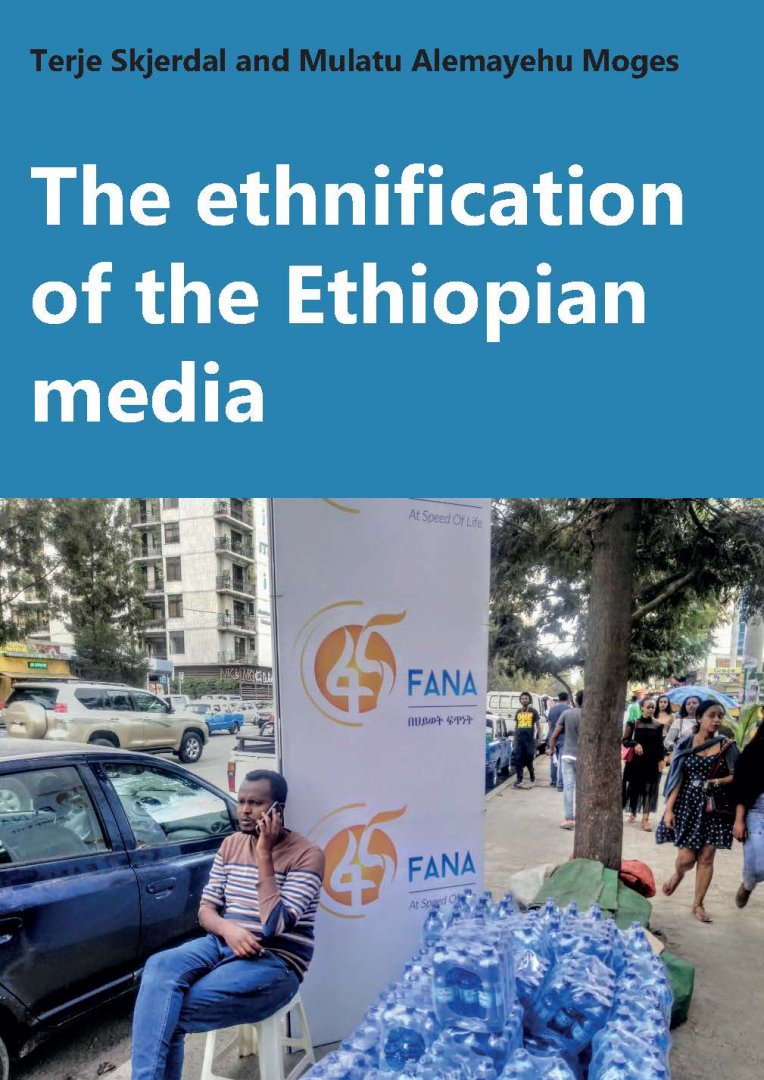
ADDIS ABABA, ETHIOPIA - APRIL 12, 2019: Ethiopians read newspapers near the Arat Kilo roundabout in Addis Ababa, Ethiopia on April 12, 2019. (Photo by Paul Schemm/The Washington Post via Getty Images)
New study documents ethnification of the Ethiopian media
The study ‘The ethnification of the Ethiopian Media’ is being released at a critical time, when conflict levels in Ethiopia are rising. Findings show how many media outlets contribute to ethnic division.
“Normally we would argue that journalism is the answer. In the case of Ethiopia, media is also becoming part of the problem. The state of the media in the country is deeply disconcerting,” says Søren Østergaard Sørensen, International Programme Manager from Fojo Media Institute and IMS .
The report, the first of its kind, documents how many media outlets in Ethiopia contribute to the ethnic polarization in the country rather than act as a unifying force.
“Ethnicity is not something new in Ethiopian media, though, with this study critical findings on this issue are brought forward. Some argue that we should not talk about ethnicity and media, but the study documents an alarming development, which needs to be addressed,” says Søren Østergaard Sørensen.
“Us” and “Them”
The cases are many. Polarized Ethiopian media are describing groups as ‘Us’ and ‘Them’ based on their own ethnic affiliation. Most of the media in the study were found to be using labels or stereotypes to show either hate towards other groups or to undermine their role in society.
“In a historic perspective it is understandable that the newfound freedom of expression is used by media organisations to break the taboos of expressing diversity of ethnic and cultural identities. The challenge for the Ethiopian media sector, however, is how this practice can develop in a responsible manner without inciting violence and creating dangerous rifts in the society,” says Søren Østergaard Sørensen.
The ethnification of the media has already proved to be a risk to the internal stability of the country and media coverage leading to violent clashes is motivating government and security forces to crackdown on private opposition media outlets.
“The tendency to form institutional media alliances along ethnic lines could hamper the ambition to create a self-regulatory media system of institutions cooperating on a common cause,” Søren Østergaard Sørensen explains, adding that Fojo’s and IMS’ joint programme in Ethiopia, launched in 2018, has recently strengthened its focus on media inclusion.
Push for dialogue and professionalism
During the summer, the preliminary findings of the study were presented at one of the few conferences, allowed due to Covid-19, attended by a broad range of media leaders as well as government officials. It is a deliberate focus of Fojo and IMS to bring representatives together from across society.
“We aim to push for continuous dialogue, as well as continue our work on media reform and strengthening media professionalism,” says Søren Østergaard Sørensen, and adds:
“When it comes to professional ideals, many Ethiopian media outlets practice a hybrid style of reporting, which blends acknowledged journalism standards with an interventionist or activist agenda. Our study finds that these ethnic and political agendas are coming at odds with media professionalism”.
The study and it’s finding
The authors of ‘The ethnification of the Ethiopian media’ are associate professor in journalism Terje Skjerdal at NLA University College, Kristiansand, Norway and assistant professor of journalism and communication at Addis Ababa University. Terje Skjerdal has taught and researched journalism in Ethiopia since 2002 and Mulatu Alemayehu has published a number of reports and his doctoral studies about journalism in Ethiopia. ‘The ethnification of the Ethiopian media’ is commissioned by Fojo Media Institute and IMS.
The report examines the role of the media in ethnic tensions in contemporary Ethiopia. It is the first study of its kind ever to be published in Ethiopia. The methodology of the study combines in-depth interviews of key media professionals with an analysis of the media coverage of eight crucial incidents between 2018 and 2020.
Even though the conditions for the Ethiopian media has improved under the leadership of Prime Minister Abiy Ahmed, the report finds that the state of the media in the country is deeply disconcerting. The reason for this is that the media landscape is as polarized as never before mainly due to an intensified ethnification process. Based on the research, the authors have found evidence for the conclusion that ethnic belonging and identity politics are gaining significance as a central frame of reference in the current Ethiopian media discourse.
The study shows that media practitioners are deeply concerned about the significant trend towards more polarisation fueled by ethno-nationalistic media of different origin and ownership, vis-à-vis pan-Ethiopian channels. The previous stronghold of the federal state media (EPRDF-supportive) has been overtaken by a fragmented state media structure with growing significance of regional mass media agencies.
Journalists are beginning to form alliances along regional and ethnic lines. This trend is clearly illustrated by the establishment of the Amhara Journalist Association, Oromia Journalist Association, and Tigray Journalist Association to name a few examples. Journalists are highly inclined to use sources that support their own ideological interest and avoid quoting sources from other ethnicities could balance the story.





